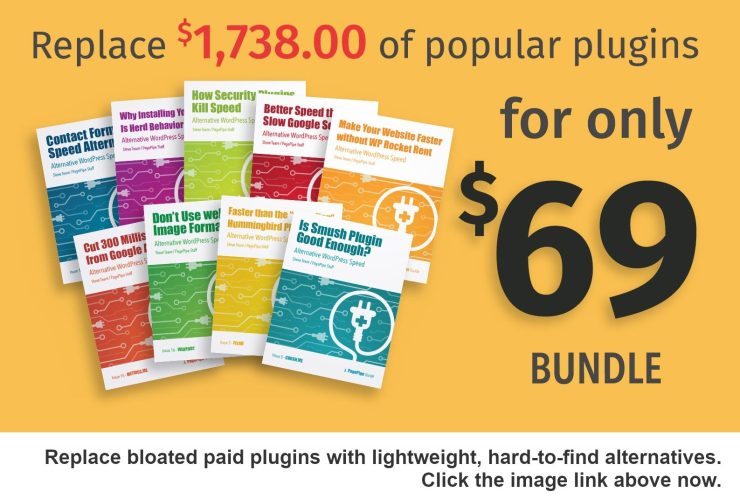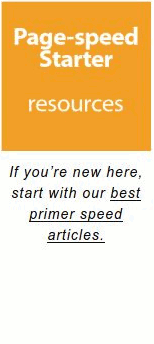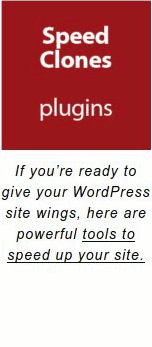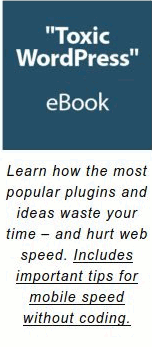You’ll weep when you read Google’s 200 Ranking Factors: The Complete List. Because it’s so sad? No. Because it’s so overwhelming. It an encyclopedic explanation of Search Engine Optimization (SEO). The article makes SEO sound so complex and mysterious – and confusing. It implies little nitpick details make a big difference. It’s anxiety producing.
But still, we recommend reading the whole thing anyway. Some people may then try gaming all silly 200 SEO factors. Don’t go there!
Will these “tricks” help more than writing good content?
Absolutely not.
SEO fiddling is a waste of time.
Be calm. Good page ranking is within your reach if you:
-
Write about topics people want to read.
-
Write content in an interesting way that keeps visitors reading more.
-
You make text readable. What’s readable? Readability is the appearance or perception text may be easy to consume. That mean placing subhead and captions for skim readers. Use short words, short sentences, and short paragraphs. Then they will spend more time after skimming content cues and clues.
The article doesn’t reveal the hierarchy of ranking factors. What matters most is the summary list at the very end. Many will never make it there. It requires a lot of boring scrolling to arrive at the real pithy basics.
The author presents a shortlist at the end. These are the real fundamentals of what counts. They’re the most important Google ranking factors (or signals) according to the SEO article. But they aren’t explained in plain English. So we’ll attempt translating some more.
Here’s his list with our commentary:
- Referring domains
This is other websites linking to yours. It’s them choosing to advertise your site’s valuable content for free. Again, relevant content is good writing about interesting things. So get rid of your dud articles and uninteresting posts. Don’t make site-noise diluting “user attention.” That’s simple positioning strategy 101. Referring domains is the biggest influence on SEO. If you game inbound links with a link farm or purchased backlinks – there’s bad news. When Google gets wise to your ploy, they’ll punish you. Even blacklist your site. That sharp retaliation indicates the significance of this “ranking factor.” No mercy. - Organic click-through-rate
Organic means Google non-paid listing. CTR is the percentage of *impressions* resulting in a “listing click” for a website. What’s an impression? That’s the number of times your listing (page title) gets viewed on the search engine page. You can view a page of 10 listings. If your your page title is chosen – bingo – that’s a “click.” If you own most of the 10 first-page listings, that’s called page dominance. When a searching reader suspects finding relevant content on your site, that’s information scent. What affects visitor suspicion or cues most? 1) The page title. 2) The “snippet” constructed by Google RankBrain, and 3) your publication date (freshness) if indicated. Publication dates are changed in WordPress for freshening up evergreen content. The snippet refers to a description extracted from page content. - Domain authority
The only thing controllable here is the longevity of your domain name. That’s right – the date when you registered your name. You can buy an old domain name that’s in use and re-purpose it. Gaming the system. But then it’s back to writing good relevant content as the main influence of authority. Serve up user-valued information. - Mobile usability
Mobile-first ranking is only two things: responsive screens and fast speed. And avoiding certain stupid web practices anyway. Like interstitial ads. Google AMP and Mobile Applications aren’t mentioned as good tricks. Praise the Lord! - Dwell time
This is also called engagement. It’s time spent reading or consuming your wonderful page content. What helps with engagement? Good writing and interesting images. And suggesting relevant articles to keep people on your site reading more once there. - Total number of backlinks
You can’t game or cheat backlinks without penalty. See the first item “Domain authority.” - Content quality
Isn’t this about writing quality? Learned skills. Writing stuff people want to read. - On-page SEO
A page title is a solid suggestion. This is an interesting and attention-getting headline. But it also needs to contain your keywords (positioning statement). Example: Yoast SEO plugin affects mobile WordPress speed. Then change it into a question: How does Yoast SEO affect mobile WordPress speed? or 10 ways Yoast SEO ruins mobile WordPress speed. Use good headline writing styles developed during the direct-mail years of graphic design.
ESOTERIC ON-PAGE-SEO DETAILS FOR THE TERMINALLY BORED
- Outbound links are a relevancy signal.
PagePipe uses outbound links (resources) for credibility enhancement. Readers appreciate offsite links. How do we know? Feedback! They tell us in emails. And they see it as courageous. Because we might be sending them away from our site for good. Risk taking or confidence our content is good enough. But most often, they return to our tab. - Internal links are good (of course you reference your other written material – duh. Common sense).
- Speed affects repeat visits – is that a surprise?
- Use synonyms for keywords – another “shocking” suggestion.
- Use ALT and title tags with keywords on image file names.
- Longer content ranks higher. Increase average dwell time by writing long, engaging content that keeps people reading. If you love your site topic or focus this shouldn’t be a burden. If you don’t have a fascination about your chosen field, you’d better quit now.
MYTH: I’ve installed Yoast, so I’m all set
Sometimes, this statement makes me want to spit out my coffee and laugh; other times, it makes me sad that new bloggers can be so gullible and clueless.
Why?
Because this is an utterly ridiculous statement.
First, some newer bloggers mistakenly think that Yoast “gives them SEO.” And, of course, it doesn’t. In fact, there is no plugin that “gives you SEO.” There is no such thing. Rather the blog posts you write and the activities you do for a post will get you organic traffic. There is no silver bullet and no easy way around this.
Rather, Yoast attempts to measure your SEO. It uses some basic formulas that “check off” some of the boxes. Notice how I say “attempts.” This is because it’s very formulaic. And, also, it’s not very accurate nor predictive. In fact, often it gives you bad advice because it will direct you to do things that will lead to keyword stuffing (which is very bad for SEO) as well as poor writing, and that is bad for user experience. And, if it’s a bad user experience, it’s bad for SEO.
Many people mistakenly think that if they get a green light that their post is SEO optimized and will rank well. This simply isn’t true. Far from it. It’s all based on the keyword phrase that you enter. It does not tell you if that’s a highly searched term nor your chances of ranking for it. And, it’s simply garbage in/garbage out.
Isn’t “on-page SEO” obvious best practices and common sense for writing?
Here’s the bottom line:
WRITE CONTENT PEOPLE WANT TO READ
That includes readability – not mentioned anywhere in the article or list. Make words look fun, easy, or interesting to read is a goal affecting SEO. Or at least, get out of the way of reading the words like fast speed or responsive sites remove barriers.
On websites, transparent features mean being invisible or undetectable. Speed is transparent when it’s fast. No one notices a fast page. But everyone hates a slow one. The best speed is instant page changes when clicked. Good speed is a transparent feature differentiating a site from competitors.
It’s our opinion, social sharing doesn’t affect page rank directly. But in general, it takes traffic away from your site – and when there the seduced visitor never returns. Social rarely brings quality visitors. Social 1) slows down your pages, 2) causes link clutter, 3) and takes people away. Is that helpful?
We ask clients if they quantify how much profit is because of social media. They can never answer that question. Why? Because it’s immeasurable. They’re following the web herd. All paid themes come with social links built-in. So that feature must be good. Right? Themes sometimes have heavy sliders, too. Uh. Not good. Theme authors include every feature trying to please everyone.
In another article, the author recommends using “2018” “best” “guide” and “review” in titles. Make the title an “H1” tag. WordPress already does this.
Your SEO mission: learn writing skills.
Content IS the user experience.
Please remember relevant content is number one for SEO. Speed affects User Experience (UX). Good UX then influences metrics like dwell time, bounce rate, and click through. Google interprets those as user intent.
User intent is a major factor in search engine optimization and conversion optimization.
Speed affects page ranking less than 1 percent. But everyone hates a slow page. That’s not being hospitable or polite.
Speed is about kindness!
Common-sense tip number one: Good Titles.
Writing good titles for your WordPress posts should be obvious. But we’re always stunned at how many sites don’t use this simple tactic to improve Search Engine Optimization (SEO) and click through.
Page title is important. People choose to click your listing on the Search Engine Results Page (SERP) instead of nine other competitive page titles. A title arouses human curiosity. If it doesn’t, it’s a loser. The WordPress permalink is written for machines (search). It doesn’t need to match. Title is an important controllable indicator of relevant content in the search listings. This affects findability, too.
People read your article based on it’s title.
A good title reads like a headline. A plugin we used for a year is a good teacher for writing better titles. Title Experiments is a free plugin available in the WordPress plugin repository. The plugin allows you to test multiple title variations for any post or page.

★ ★ ★ ★ ★
WP Title Experiments Free
Load Time: 70 milliseconds
Title Experiments relies on the old classic WordPress editor. It won’t be updated to support Gutenberg block editor added in WP 5.x. This is the author’s excuse to ditch the paid plugin. It’s plain he’s disappointed by the lack of plugin income. No enthusiasm to go on.
Our workaround is simple. Use the Classic Editor Plugin with the Classic Editor Addon. So even if your core version is 5.0+ and your running PHP 7.x, things still work.
Title Experiments is a helpful plugin. We learned a lot about what titles work and what doesn’t for user engagement. But the heavy plugin was a top contributors to site drag. So we removed it after our education on writing better headlines (page titles).
Title Experiments relies heavily on the old editor of WordPress and will not be updated to support Gutenberg (WPv5.0+).
This is an author’s excuse to ditch the plugin.
Every year we review the last 4 months of traffic and see what is performing and trending. We’ve found our worst performing posts always have a lame headline (title). Renaming the post is the best thing to try first. We also dump dead posts or consolidate posts. This has proven effective for three years now.
For example, a mere label such as Ferritin and Hypothyroidism could be rewritten for human interest.
“What are your optimal ferritin levels if you have hypothyroidism?”
That makes people curious and they click. Questions are always good. And including the word “you” is beneficial. Answer the readers question, “What’s in it for me?”
Purging your site is wise and focuses your content. That’s good positioning strategy. It affects perception of your site credibility.
How to find out what you should be writing about?
Intuition is needed for what future content to add. Not just metric history evaluation. The best article to write probably isn’t even on your radar yet. Our best post ideas come from reader’s emails who have questions. When we’re done writing long answers, we convert the email into a post – or add to an existing post.
Analyzing your inquiries isn’t something Google Analytics can do. Except for one helpful thing:
If you go to Google Analytics > Behavior > Site content > View full report (down in the right hand corner), you’re shown the top 10 of xxx pages. In our case 378 pages, we then change the “show rows” to 400. You then can see all posts and pages by popularity. You will see some entries with the following format:
/?s=Beaver+builder
This line above originated from our WordPress search box. A human couldn’t find something they needed on our site. Important info. They wanted to know more about Beaver Builder page builder plugin.
We don’t have a Beaver Builder article. Do we need one? Maybe.
Going to the top of the GA page, there is an Export function on the right. We download the entire set for whatever period we choose and import that into a spreadsheet.
Then we categorize and sort the “searches.” The results reveal what people were looking for. We then test by doing a Google Search on the terms with the name “PagePipe.” That reveals what kind of placement the search phrase gets in the rankings.
This influences what we write about based on reader’s questions we’re not answering. So far this is helpful. How else can you learn what you don’t know?
From our recent analysis, we generated the following preliminary titles for future posts:
- Why don’t we write about good hosts? Why only the bad ones?
- How does cookie consent compliance affect speed?
- Measuring HTTPS/SSL drag with ByteCheck
- Why we don’t review paid themes
- Why we don’t recommend CDN
- How to use Cache Enabler plugin for speed.
- Is Imsanity plugin good for speed?
- How to use Autoptimize plugin for speed.
- Magnetic versus SSD hosting for speed
- What is site-origin optimization?
- Speeding up Astra theme
- Speeding up WooCommerce sites
- Why use twenty-seventeen theme instead of twenty-nineteen?
We then work on these article ideas one-by-one.
OTHER OFFSITE LINKS ABOUT WRITING GOOD TITLES
We Analyzed 912 Million Blog Posts. Here’s What We Learned About Content Marketing
One of the biggest decisions is deciding what to not sell, who not to sell to, and what not to promise. Telling people who you’re not is just as important as telling them who you are.
You must have something of value to sell. This is called the value offer for other people. This is about some pain or anxiety visitors are trying to resolve. This is their motivation.
Creative positioning strategy is a short cut to buyer’s motivation.
An offer includes terms, warranty, delivery, price, incentives and more.
People won’t be instantly convinced you’re a credible source. Web visitors are suspicious of every website.
In Google-speak, motivation is “intent” or “relevance.” Search engines attempt to rank the content of your site for intent, relevance or credibility.
Relevance is often determined by how many people searching for a key phrase go to your site (click-thru).
So. Why aren’t you getting traffic? First, look at your first-page Google listing competitors. They’re big companies with tons of articles, authority and credibility. You have to outperform them.
Does your site appear on the first 20 pages of Google for your preferred search term. Or after ten pages do you still have nothing? Focus on what matters most to people (relevant topic).
If 33 percent of your blog traffic is funneling through an unrelated topic page, these people have no intention of buying services or products. We recommend monetizing the page with a relevant paid download – or spin it off as a separate website – or else get rid of it.
Why get rid of a page creating 10,000 visitors a month? Because they aren’t qualified leads. It’s causing noise or dilution. Content pollution.
What’s a qualified lead?
A qualified lead (visitor) has money (budget), authority to buy, is ready to buy (timing), has the problem you can solve (need).
If a site bounce rate is 80 percent, those are people who don’t care and leave immediately. While we’ve seen worse, that isn’t goodness. Only 20 percent of people visiting stay and read something. The most they’ll read is a partial article. 80 percent leave instantly.
Maintaining an email list may not improve business profits. Selling an Amazon book may not increase business profits. They do increase “credibility” but they don’t increase profits.
Credibility consists of three components: trustworthiness, expertise, and enthusiasm. Credibility influences people or persuades them you can deliver what you promise. Remember they’re suspicious of all websites, not just yours.
Content is the user experience. What helps convince visitors you’re credible is how much content you’ve written related to solving their problem. That’s an “authority” goal of 50 articles. But if the articles don’t help them and are just fluffy, they won’t be convinced. “Fluffy” is referred to as thin content by Google. When you give away valuable information, visitors (and Google) are more prone to trust you more. The trust less if you charge for every little thing.
We dump 30 percent of PagePipe’s technical content each year. Typically the 30 to 40 least popular articles. Why? We revisit our core pages, homepage, etc. and improve how well they target our specific audience. We don’t want to dilute our best content with thin content. That makes it hard for people to decide what to read.
Our goal is selling:
- DIY ebooks.
- speed services.
- rebuild websites.
Our break even is incredibly low. We don’t use any paid plugins or themes and we host on a cheap, shared server ($70 to $95 per year) with no paid services like CDN. We don’t advertise or monetize.
If you have no enthusiasm for your site topic, people will know. They will be unconvinced you’ll improve their life.
Will you produce valuable content for your audience? That’s more important than speed.
Godspeed-
![]()
Steve Teare
performance engineer
April 2025
PagePipe Site Tuning Services for Speed
Instead of band-aid approaches, we drill down to the root cause of your slow site. This is origin optimization. Also known as site tuning. To do this, we analyze site components:
- Hosting
- Theme
- Plugins
- Scripts and third-party services.
- Images and media library.
- We minimize globally loading plugin effects.
Find out more details about Site Tuning – Get Speed!






